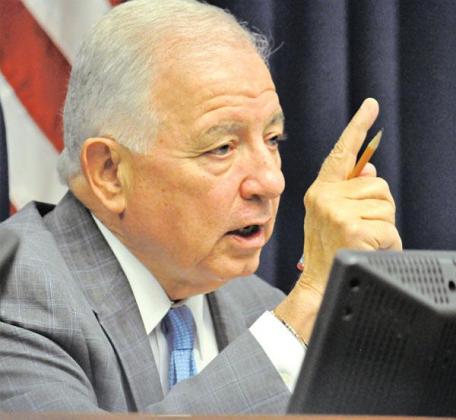
Sam Karlin/Manship School News Service
Sen. Ronnie Johns, R-Lake Charles, moved his Senate Bill 144, through the Senate Judiciary Committee Tuesday aims to protect young women from human trafficking by prohibiting strippers under the age of 18, three years younger than what he wanted.
The tweaks, authored by Sen. J.P. Morrell, D-New Orleans, amended the original bill’s most significant premise: raising the minimum age of dancers at strip clubs and similar venues to 21. Morrell’s amendment, which was supported by every committee member but Johns, took the age back to the original 18-and-up.
The committee was unanimous in its decision to send the amended bill to the full Senate for debate.
Morrell argued that sex trafficking does not specifically affect people age 18 to 21, but all people. He said his amendment seeks to protect everyone, not just the youngest sect.
Morrell’s amendment, to which only Johns objected to on final vote, also establishes human trafficking education training program created by Alcohol and Tobacco Control and implemented by the adult entertainment venue, which encompasses all types of organizations, including strip clubs, truck stops and adult stores.
The amendment also restricts alcohol and beverage licenses to venues that fail to comply with the provisions. Morrell said the purpose of this was to hold all involved accountable, not just those who are under-aged.
“If there’s no alcohol at a lot of these venues, then these venues cease to exist,” Morrell said.
Johns’ Senate Bill 90, which last year passed without dissent through the House and Senate into law, only raised the age the stripper age to 21. A U.S. federal judge ruled that the original language was vague and overbroad, but did not reference the minimum age requirement of 21 as an issue.
After the committee adjourned, New Orleans Councilmember Kristin Gisleson Palmer called Morrell’s amendment “bullshit.”
“If they were genuinely concerned, they would do the amendments but keep it at 21,” Gisleson Palmer said. She said mandating the age to 21 is easier to enforce, and Morrell’s provision changes nothing.
“All it’s doing is making all the senators feel better for voting against the 21 [mandate] because the strip club industry was scared this would set a precedent that would go nationwide to change all ages to 21 [and reduce revenues]...They don’t genuinely care.”
Gisleson Palmer, who grew up in New Orleans, testified before the committee with the story of her identical twin sisters, one of which began stripping at age 19 and fell subject to depression and a vicious cycle of drugs, alcohol and sexual abuse.
Eventually, despite countless efforts and searches on Bourbon Street by Gisleson Palmer and her seven other siblings, both twins committed suicide within a year and a half of one another.
“There is no doubt in my mind that [my sister’s] stripping was a major contributing factor to her death,” Gisleson Palmer told the committee.
“No one under 21 can drink alcohol or go into these establishments,” Gisleson Palmer told the committee. “Why should they be allowed to strip there?” Gisleson Palmer noted current workers are hired as independent contractors, not employees with benefits or hourly wage.
Assistant Attorney General Emily Andrews reminded the committee that the judge ruled the act vague and overbroad because it could apply to theatrical performances, such as ballets or burlesque shows, where there would be semi-nude young women and alcohol beverages would be served. SB144 was amended to exempt such performances.
Undercover law enforcement found drug dealing and prostitution in 24 Louisiana strip clubs in October 2015. The U.S. Department of Justice reported in 2016 that human trafficking victims are often forced and coerced to perform commercial sex acts in strip clubs and massage parlors.
Jim Kelly, executive director of Covenant House in New Orleans, said 70 percent of the 90 human trafficking victims his organization has treated in the past 12 months were from Louisiana.
Of those victims, Kelly said, 55 percent of their female victim survivors have a history of dancing in clubs, while 98 percent had danced in a club before age 21. Kelly also said 94 percent of those survivors were first trafficked before they were 21. Nearly all of those victims had a previous history of sexual abuse, assault and rape, and nearly all suffer from trauma.
Alexander Lutnick, senior assistant at RTI International, which conducts research on human trafficking, also said many cases that Johns’ bill seeks to eliminate stem from a young woman’s intimate partner coercing her to dance at the clubs. Lutnick said the provisions should be expanded to include young adult men, as well as other labor sectors beyond strip clubs.
The lone woman on the committee, Sen. Karen Carter Peterson, D-New Orleans, said she would like to see hard data from those both for and against the 18-and-up provision.
Johns, who left the meeting disappointed, said he “really likes” parts of Morrell’s amendment, but it undermines his original intent. “It’s baby steps.”
